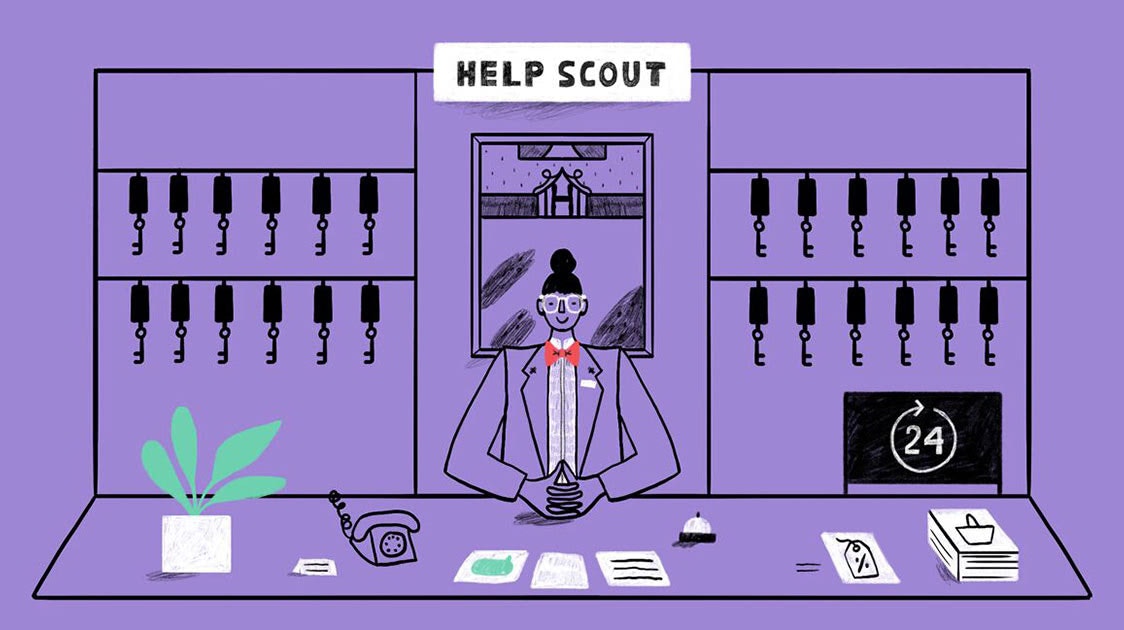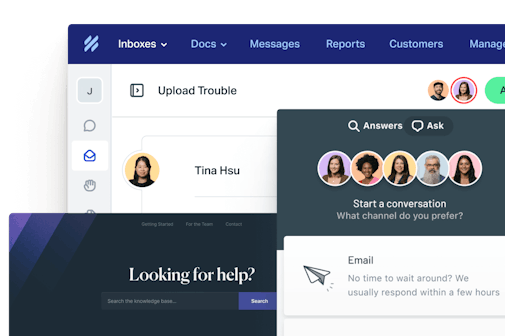In 2015, we arrived at the somewhat reluctant conclusion that it may be time for Help Scout to explore “doing sales.”
For a business that prides itself on being customer-first and product driven, the concept of sales — even sales as a service — was fraught. In our opinion, the way other SaaS companies approached sales left a lot to be desired. It wasn’t that their more traditional approach to sales didn’t work — arguably, it works more efficiently than a sales-as-a-service process ever could.
That little boost in sales productivity comes at a price, though — and that price is customer experience.
A poor customer experience is filled with multiple handoffs. It means working with folks who are only specialized in a certain portion of the customer’s journey, and who require you to jump through multiple hoops, and repeat yourself until you get to the answers and information you need. Often each of these “specialized” roles have goals in mind that aren’t directly aligned with customers’ needs — like booking a meeting, qualifying the opportunity, giving a demo, closing the deal, and so on. It doesn’t matter what the customer’s goal is for the interaction; the process is tailored to the business’s goals, not the customer’s.
This wasn’t the Help Scout way. We were determined to optimize for the customer — not our productivity.
Like everything we do at Help Scout, we spent a lot of time thinking about the customer experience once we decided to experiment with sales. We were determined to avoid any sales experience that left customers with a bad taste in their mouth. Our sales process needed to be a value-add not only for our business, but also — and more importantly — for our customers.
What does ‘sales as a service’ mean?
“Sales as a service” means taking a concierge approach to sales. It doesn’t stop with being consultative; it means being a trusted advisor throughout the buyer’s journey.
At Help Scout, our Sales team acts as more of a services department. It’s our job to guide customers to a successful outcome. We wanted to design the sales process around customers and adjust the process according to their needs. (After all, it’s optional for them to work with us.)
We work to provide customers with the most seamless experience possible as they’re evaluating us as a solution. It’s different than the old approach of sell the vision, collect the money, then ship ’em off to someone else. We guide customers through evaluation, onboarding and setup as part of our sales process to ensure we deliver and that they’re successful.
If I had to explain the difference between our approach to sales, it’s that we’re there to consult, not convince. After learning about a new team, we work with them to tailor an account to meet their goals — and then support them through training and launch. The result is that each customer we onboard is truly a new partnership.

Jake Borr
Account Executive
In previous roles, I always felt like I was wrong for working with a customer and ‘caring too much.’ I was often told to ‘let it go’ and ‘let the customer success managers deal with it.’ Sales at Help Scout is so much more than hitting a monetary goal every month. A customer making a commitment to use Help Scout is just the beginning of our team’s journey with them. The real fun is in account setup and team training, and getting the opportunity to build an ongoing relationship with our customers.

Zainab Allawala
Account Executive
The difference for me is a mindset of ‘How can I help?’ vs. ‘How can I ensure you are my next customer?’ This means I’m equally empowered to tell someone we aren’t a good fit as I am to go over the top in working hands-on with a customer to see them be successful.

Ryan Caven
Account Executive
Sales at Help Scout feels completely different from previous roles. I feel like I’m part of a special forces team, and we’re in it together trying to solve complex, salient challenges that support and service teams face today. We work together. We help each other, and I feel everyone involved can sense that.

Casey Lockwood
Account Executive
Sales is about being the ‘ultimate guide’
Fortunately, the days of Sales being the gatekeeper of information are long gone — or at least are no longer the status quo. The buying process has changed, and Sales’ role must change as well.
In today’s world, the buyer has more power and information available than ever before. They start with Google, then read customer reviews. They can sign up for a free trial, read help documentation, and even purchase, all without ever talking to anyone.
On the flip side, this wealth of information and abundance of options can make the decision-making process stressful.
Sales’ job in today’s world is to help make sense of the noise to help the customer achieve their desired outcome.
I’ll give you an example: Say you’re in a new city, in a country you’ve never visited, and you’re looking for a restaurant where you’re going to propose to your partner. You want this restaurant to have great service, a stellar menu and wine list, and an awesome atmosphere. What do you do?
One approach is to visit Google and read Yelp reviews, then narrow it down to 10 restaurants that meet your criteria and have good reviews. Which are closest to where you’re staying? Do you need to make reservations, or can you just show up? What’s the best way to get there — Lyft, a train, the bus, a limo? What are the pros and cons of each option in this city? What’s the dress code? How can you be sure you’ll get a good table? How can you secretly let the server know your plans and make arrangements accordingly?
Another approach would be to call your aunt who grew up in this country — she has great taste and knows the area well. She can tell you the best place (which may not have even been on your radar), and how and when to get there. She knows the manager and can call ahead to ensure you have the best table and service. She can send you a link to the menu, her recommendations on what’s best, and key considerations when arriving.
She’s your ultimate guide: All of this in 30 minutes, with minimal stress on your end. She helped you determine a clear path to your desired outcome and made it as easy as possible to get there.
This is what sales is today. Sales as a service means organizing information, presenting it in a digestible way, and walking you through an exceptional overall experience.
Our concierge approach to sales
With this understanding in mind, we set out to build a sales team optimized to serve the customer and their needs. Regardless of whether Help Scout was going to be the right platform to help them grow their business, we would commit to providing excellent customer service.
Before we jump into the tactics of how we’ve built out our sales process, let’s talk about a few dynamics and things we learned through experimentation that influenced the approach we’ve taken:
We’re working in a well-defined market — one that has been around a long time and has dozens of solutions designed for helping businesses with their customer service needs.
Many of our larger customers already have one (or many) software tools in place to manage their customer service.
Our self-service channel works incredibly well at driving trial signups, and converting a high percentage of them to paying (and happy!) customers.
Many of the larger trial signups wanted to switch to Help Scout, but the work that accompanies that change is daunting. This is why many of them stay with their current solution.
This same group of customers often has unique requirements they need to discuss at length to determine whether Help Scout could indeed solve their problems. They require coordinated communication across multiple people, sometimes even multiple departments.
After a year of research and experimentation, we learned our larger potential customers required a level of concierge service that our self-service approach didn’t offer. This is what our sales team needed to provide.
Tactical implementation
We decided to go all-in on this concierge approach, which meant our sales team needed to do more than give demos, get contracts signed, and collect money. They needed to focus on creating a memorable and valuable experience from the first contact all the way through successful deployment and adoption of Help Scout. This is a lot to ask of a single person and we could do it more efficiently, but customer experience is the first priority.
Our Account Executives are focused on helping customers through:
Evaluation: We invest time in learning about not only your goals, but also about your team’s existing systems and processes. Our goal is to lead with curiosity around how your business works so we can be sure Help Scout is a good fit. (If it’s not, we’ll steer you in the right direction.) We’ll also use this information to personalize your account setup, training, and onboarding.
Account or Trial Setup: We work with you hands-on to make sure your account is set up properly and ready for liftoff. During this process, we go through Mailbox setup, creating automations, adding integrations, designing processes, and so on.
Team Training: Once your account is looking and feeling good, we work with your team to get everyone all aboard the Help Scout train. We facilitate live training sessions to ensure everyone understands how Help Scout works and what their day-to-day will be like.
Launch Assistance: The experience doesn’t end at team training. We support you through your first few weeks (sometimes months, if needed) to work through post-launch questions, account modifications, process redesign, and so on.
Around-the-Clock Support: In addition to your dedicated Account Executive, you have 24/6 access to the world-class Help Scout support team. These incredibly knowledgeable folks are ready to spring into action whenever you or your teammates have questions.
With this approach, we’ve ensured our sales team stays aligned on what is ultimately most important: our customer’s success.
What embracing sales as a service can do for your business
Embracing sales as a service can be a true differentiator for your business. It sure has been for us. Since launching our sales efforts a few years ago:
We’ve seen a drastic increase in the number of larger customers adopting Help Scout — without cannibalizing our self-service sales funnel.
Customers who work with sales discover and adopt a wider set of features earlier in their time with us as a customer.
We’ve learned from our product research that one of the key reasons larger customers decide to go with Help Scout is due to the helpfulness of our sales team during their evaluation.
We run an NPS survey on our sales process every month and currently have a sales NPS score of 80.
It’s important to note we don’t force anyone through this process — we just offer it as a service. Our customers have embraced it too.
I was shocked by the level of one-on-one attention we received. … We are humming along with Help Scout, and everyone on my team loves it enthusiastically. It’s been a huge boon for my business, and we’re positioned well with it, for going into our long sales and busy season now.
Troy Lakey
Chief Operating Officer, TaxProMarketer
This concierge level of sales support — in which we take responsibility for making customers successful through their lifetime with the product — aligns with our adoption of Support-Driven Growth as a business approach.
We’re not handing anyone off, or merely coordinating with the support team, having them sit in on calls every once in awhile. In this model, both sales and support are responsible for success, and the lines between each field are blurred. Every customer-facing team member can speak confidently about the product, and every customer gets the onboarding they require to be successful.







